Olympic Perspective: Alfred Nakache, The “Swimmer & Survivor of Auschwitz”
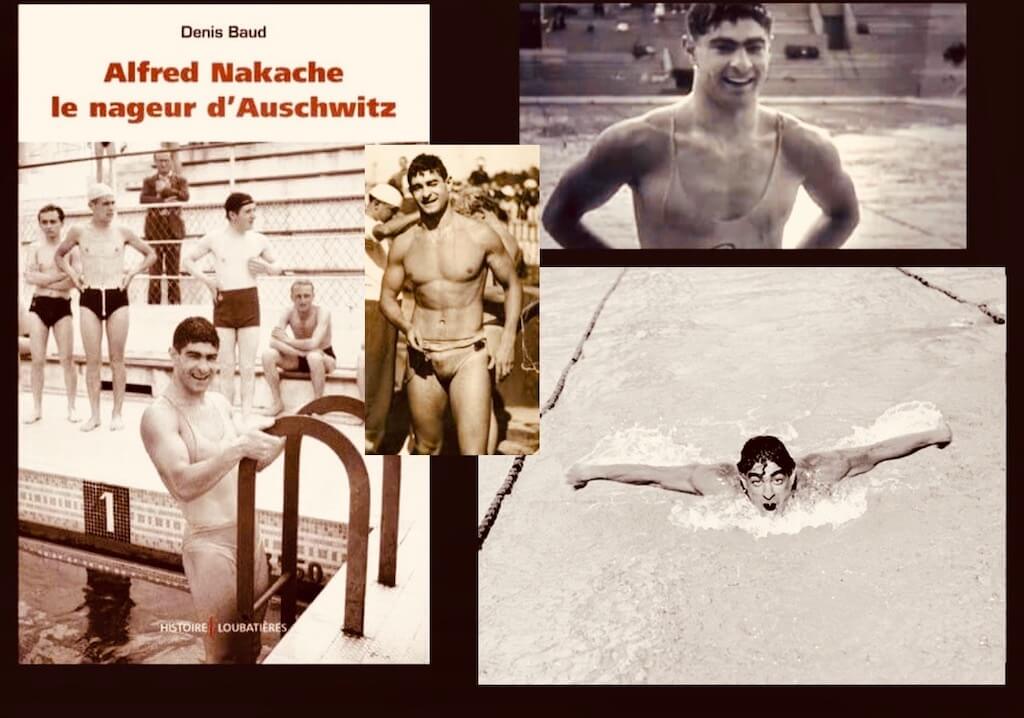
Olympic Perspective from the Past for the Present generation coming to terms with a shift from Tokyo 2020 to 2021 that offers hope not finality
This weekend, Swimming World is trawling back in history to find some of the stories of the past that contribute to our series in search of perspective for the present season of social-distancing, closures that stretch to pools, cancellations and postponements that have turned the sporting seascape and landscape into a desert.
- The Tokyo Postponement in Perspective: What Has (and Hasn’t) Stopped the Olympics
- Olympic Perspective: The Heights Of Hveger Never Seen & Other Careers Lost To War
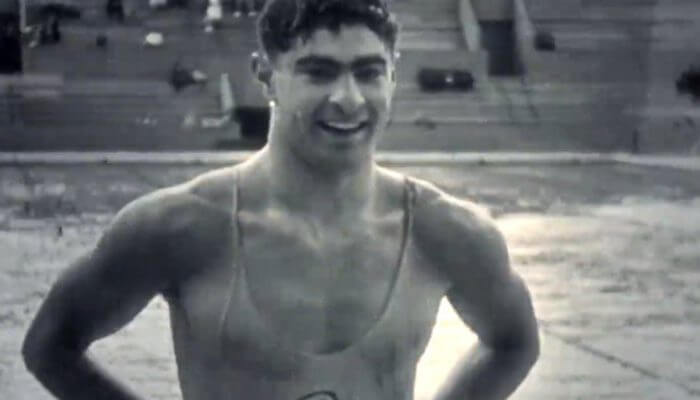
Alfred Nakache – Photo Courtesy: Alfred Nakache’s family and ISHOF
The story of Alfred “Artem” Nakache is one that transcends swimming and sport. It is a tale of human experience that most of us pray may never come to visit our lives.
Watch The French Documentary
The ISHOF Induction
Laure Manaudou and her former boyfriend Fred Bousquet, French swimmers who have a daughter together, were to have starred in a film of Nakache’s story. The news was revealed in 2009 by L’Equipe, with Jean Bodon, a professor at the University of Alabama, the brain behind the production. The project did not proceed, in part due to a lack of funding, according to the French sports newspaper.
A water polo player as well as swimmer, Nakache was posthumously inducted into the International Swimming Hall of Fame as a member of the Class of 2019 in Fort Lauderdale, Florida, May 18, 2019.
The Story Of Alfred ‘Artem’ Nakache
with contributions from Meg-Keller Marvin and Andy Ross
The name of Mark Spitz with his unprecedented seven gold medals and seven world records at the 1972 Munich Olympic Games stands out above all other achievements in Jewish sports history, but the title for the first great Jewish ‘butterfly’ swimmer, belongs to another – albeit from a time when butterfly was just a part of breaststroke, the fourth stroke yet to be born.
Alfred Nakache, born Nov. 18, 1915 in Constantine, French Algeria, was one of only two Jewish Olympians to compete in the Olympic Games after surviving a concentration camp during the Holocaust.
The Nakache family arrived in French Algeria from Iraq in the late 19th century to settle in the beautiful valley overlooking the Rhummel River. Alfred was the second of 11 children, and at about the age of 10, he learned to overcome his fear of water and began to swim.
Alfred (nicknamed Artem) was described as having “shoulders lined with hard and protruding muscles” and “gymnast’s arms and legs rather than a swimmer’s.”
But a swimmer he was. A world-class swimmer.

Photo Courtesy: Alfred Nakache’s Family
In 1931, Nakache won the Christmas Cup of Constantine Challenge. He was a member of the Nautical Youth Club of Constantine until 1934, and after a few local competitions he caught up with the idea that if he put more effort in he could win beyond his back yard pool.
Come 1933, he was racing at the French Championships. He moved to Paris at the end of the summer that year as the newly elected Nazis across the border in Germany published the first of the four lists of people whose German citizenship, passports and other privileges were withdrawn.
On the first list of Thirty-three names, were the Jewish authors Heinrich Mann, Lion Feuchtwanger, Ernst Toller and Kurt Tucholsky.
Between August 30 and September 3 of that year, the 5th Nazi Party Congress was held in Nuremberg. Hitler and Co call it the “Rally of Victory” (Reichsparteitag des Sieges) in reference to the Nazi seizure of power.
Come October 16, 1933, Germany announces its intention to officially leave the League of Nations, a history that reminds us to pay attention to events unfolding in our own time.
At the French Championships in 1934, Nakache placed second in the 100m freestyle to his idol, French swimmer Jean Taris, who had claimed silver in the 400m freestyle at the 1932 Olympic Games in Los Angeles just 0.1sec behind American movie-star-to-be Buster Crabbe, on 4:48.4.
Nakache was unable to race for France at the 1934 European Championships in Magdeburg because he was not yet eligible as a Frenchman, “having not been born on French soil”, as newspaper reports of the time note. Even so, 1934 saw him become a licensed member of The Racing Club de France, the club he raced for until 1936 at a time he was a pupil at the prestigious Lycée Janson-de-Sailly in Paris.
In 1935, Nakache claimed the French 100m freestyle title and was one of 1,000 Jewish athletes who traveled to Tel Aviv to attend the second annual Maccabiah Games. He took silver in the 100m crawl and stated that he preferred to swim breaststroke.

Photo Courtesy: Alfred Nakache’s Family
After some hesitation, the Popular Front government of France decided to send a delegation to Nazi Germany for the 1936 Berlin Olympic Games. In front of Hitler at a Berlin Games soaked in swastikas with the acceptance of the International Olympic Committee, Nakache finished fourth in the 4×200 freestyle relay with teammates Christian Talli, René Cavalero and Jean Taris, missing the bronze medal by six seconds. They may not have made the podium, but they had the pleasure of beating the Germans (who finished fifth) in their home country, 9:18.2 to 9:19.0. Japan won the event that year with a world record of 8:51.5.
Upon his return home, due to the conflict with Germany, he was forced to interrupt his studies at the Normal School of Physical Education and flee Paris with his wife, Paule, and daughter, Annie. They become refugees in Toulouse during the German occupation. As a Jew from Algeria, Albert Nakache lost his French nationality.
Between 1936 and 1944, Nakache won the French 100 freestyle six times, the 200 free four times, the 200 breaststroke four times and an assortment of other French swimming titles, many of them setting national records.
Between 1935 and 1938, Nakache practiced the new butterfly-breaststroke, a version of the stroke that would lead to the birth of butterfly and 1954 breaststroke rules forbidding overarm recovery. After receiving his certificate as a professor of Physical Education, in 1939, Nakache joined the French Air Force in preparation for war with Germany.

Photo Courtesy: Alfred Nakache’s Family
By 1941, Nakache was at the height of his swimming career. Racing for the prestigious TOEC Dauphins swim club in Toulouse, he broke records in France as well as all over Europe. On July 6 of that yea – in the seawater pool of the Catalans in Marseille – Nakache broke the world record in the 200 breaststroke with a time of 2:36.8, bettering American Jack Kasley’s record of 2:37.2, set in 1936. Nakache’s record lasted for five years, and was finally broken by Joe Verdeur of the USA (2:35.6, 1946).
In 1941 and 1942 Nakache won six French National titles, one claimed in Marseille taking down Kasley’s world record and the European record of Joachim Balke, the German champion and seventh-place finisher over 200m at a home 1936 Olympic Games.
Balke’s European 100m record also fell to Nakache that summer, in 1:09.4 in Toulouse in June. At the time, a French journalist wrote:
“The Jew Nakache should not be allowed to hold any European titles because he is Jewish.”
The following year, the European Championships were cancelled at the height of war but Nakache clocked a 1:08.6 European 100m breaststroke record back in Toulouse in February 1942. It would be the last record of a career that would end in tragic circumstances before being reborn beyond the War.
During this time, Nakache began approaching the Jewish resistance networks, such as the Armée Juive (Jewish Army), mainly by helping with the physical preparation of the recruits.
Anti-Semitic persecution intensified all over Europe, and on August 26, 1942, nearly 1,000 Jews were rounded up in Toulouse. The media was split in their support for Nakache.
While some welcomed his swimming and the records broken by Nakache, others called for his exclusion from national competitions because of his “Jewishness.”
The French Swimming Federation finally gave in to the pressure from the Germans, and banned Alfred Nakache from swimming in the 1943 national championships. That decision remains a source of shame for the FFN to this day.
At the time of his records, the Nazis occupied France, and he fought against their claim that “the Jew Nakache…polluted the waters of French pools!”
In the early part of the 1940’s as the Nazi occupation of France took hold, Nakache was forced to flee to Toulouse, into the unoccupied “Free Zone”, with his new wife Paule. There he was welcomed like a son by two historical figures of French swimming, coach Alban Minville and Jules Jany. He was provided a gym to run and he began training with Mainville’s Toulouse Olympic Employee’s Club Dauphins.
While media and officials tried many tricks and cited many clauses and rules to keep Nakache out of the water, some French swimmers withdrew from national competitions in support of their fellow athlete.
Their efforts were in vain.
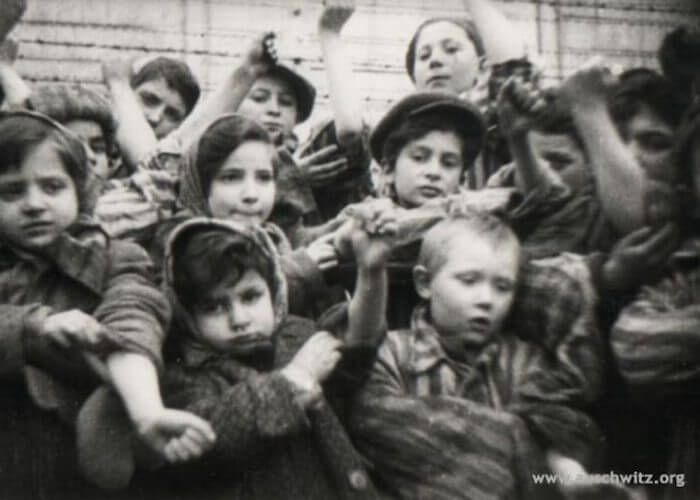
Children at the liberation of Auschwitz – Photo Courtesy: www.auschwitz.org, the Auschwitz Museum
When the deportation of the Jews began, Nakache was betrayed by a “friend”, and he – along with his wife (and eventually their daughter after she was found with family friends in hiding) were arrested by the Nazis on November 1943 and deported to the Auschwitz concentration camp in January 1944. The sign above the gate, “Arbeit Macht Frei” – Work sets you free – would play out in a macabre way in Nakache’s life.
His wife and 2-year old daughter were murdered by the Nazis upon their arrival in Germany. Of the 1,368 men, women and children in their death camp convoy, only 47 survived.
Nakache was ’employed’ by the Nazis to help with its camp fitness regime. He was caught swimming in one of the water tanks, so the camp guards punished him by insisting he swim every day, including at times when it was snowing an ice formed on the surface of the water.
Toward the end of the War, Alfred was moved to another concentration camp, Buchenwald, and in 1945 was freed by the Allies. Nakache was one of the 47 survivors of this camp, weighing only 42 kg (92 pounds) at the time.
Four months later, he returned to Toulouse to live with Alex Jany and his family, where he started training under Coach Alban Minville. Less than a year after the liberation of Buchenwald, he was part of the French team in 1946 that set a world record in the 3×100 relay (3 strokes). That same year, he also became the French national champion in the 200 breast and 4×200 freestyle relay.

Photo Courtesy: Alfred Nakache’s Family
At 34, Nakache formed part of his club’s French-title winning 4×200m freestyle relay on his way to a remarkable achievement.
At the 1948 Olympic Games in London, Nakache swam the 200 breaststroke, placing 12th in prelims (2:50.4) to reach the semifinals, where he finished 16th (2:59.1). After swimming concluded, he was a member of the French water polo team that finished in sixth place overall.
As far as is known, he was one of only two Jewish athletes who competed in the Olympics after surviving the Holocaust.
Nakache retired from swimming in the early 1950s and devoted himself to his gym and teaching. In addition, hehelped train 1952 Olympic champion Jean Boiteux. With his long over-due induction, Nakache will forever bereunited with his idol, Jean Taris, his coach Alban Minville and world-record setting relay teammates, Georges Vallerey and Alex Jany, into the International Swimming Hall of Fame.
Nakache retired from swimming in the 1950s and devoted himself to his gym and teaching. He also remarried a young girl, Mary, from Sete. Nakache helped train ISHOF Honoree and French swimmer, Jean Boiteux.
In 1983, in a sad irony of fate, Nakache drowned, suffering a heart attack during his daily swim in the port of Cerberus.
Nakache was inducted into the International Jewish Sports Hall of Fame in 1993.
Many pools in France bear his name, such as the City of Toulouse main swimming pool, named in 1944, when he was in the concentration camp in Auschwitz and believed to have already perished.
He lived long after to see the pools named in his honour.
Images From Alfred Nakache’s Hall of Fame Induction:
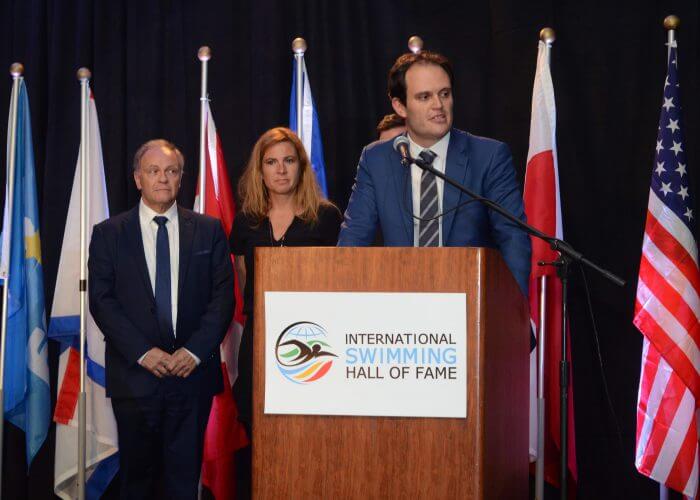
Family of Alfred Nakache; Photo Courtesy: JM STREINER
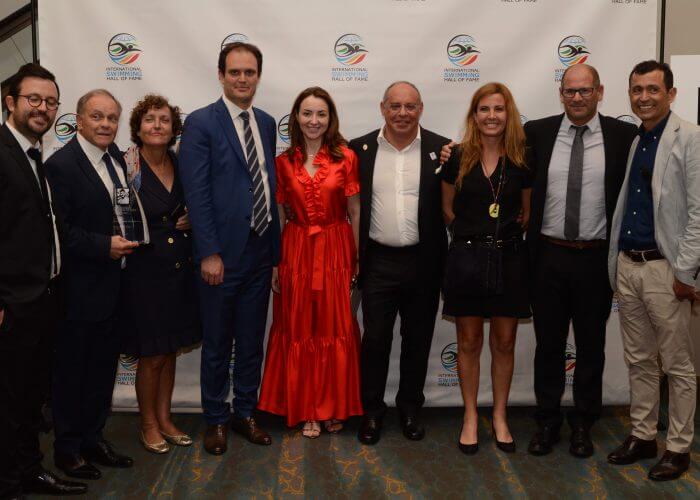
Photo Courtesy: JM STREINER




Amazing story! But they kept talking about him swimming breast stroke while showing video of him swimming fly..,,
He swam butterfly – breastroke legs with fly arms. That was a stroke back then.
It was breaststroke, with butterfly arms… there was no ‘butterfly’ until the 1950s … medley relays were 3×100 🙂
Kelly Spencer Williams in his day breaststroke became a stroke with overarm recovery … some swam traditional stroke but most in many events used what’s today ‘fly arms… the strokes got split officially in 1954 as ‘butterfly, was born
Craig Lord thank you!
Brooke Zukowski
What an amazing and heroic story. To experience such racism and still rise above it to accomplish greatness is proof that the human spirit can never be broken ??♂️?
This story reminds me of the movie “unbroken” and theme song. As I read I played the song in my mind.??♂️?
https://youtu.be/Z9LH0ChM1eI
https://youtu.be/Z9LH0ChM1eI
Heightens awareness, with fantastic breadth-depth. Vital. Thank you. Great vital work ! What a life warrior !
Waldemar Mocki
As long as such men exist, Evil will not triumph.
🙂 Indeed not, Jacques.
Craig I couldn’t imagine a more inspiring story to read at this challenging time:Alfred Nakache – a remarkable indomitable man. The other Jewish athlete to compete in the Olympics having survived the Nazi concentration camps is Ben Helfgott now 90 a weightlifterMelbourne & Rome.
Indeed, Peter. Thanks for mentioning Ben, I was unaware of him. 🙂